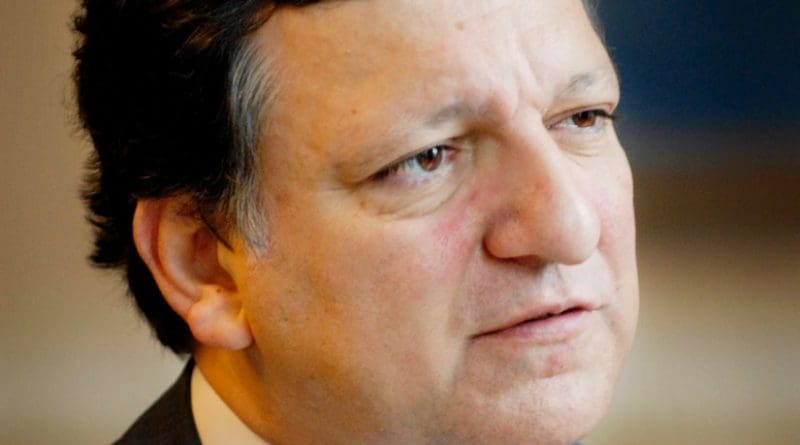European Parliament Hails Barroso’s Eurozone Plan
By EurActiv
The leaders of the four largest groups in the European Parliament have strongly backed a plan by Commission President José Manuel Barroso to deal with the eurozone crisis, strengthening his position ahead of a crunch EU summit later this month.
Speaking in Parliament on Wednesday (12 October), Barroso unveiled proposals aimed at breaking “the vicious cycle of uncertainty over sovereign debt sustainability”.
Barroso admitted that since the sub-prime crisis in the US developed into a world crisis, the EU had come up with different initiatives, which now need to be put together and streamlined.
The five elements of the roadmap he presented were interdependent and must be implemented simultaneously, he insisted.
The five elements are helping to solve the problems of cash-strapped Greece, strengthen the euro area, strengthen the banking system through recapitalisation, pursue growth policies and build stronger economic governance.
EFSF ‘maximised’
Barroso called on Slovakia, the only country that has failed to ratify the European Financial Stability Facility (EFSF), to do so in a second round of voting this week.
“I call upon all parties in the Slovak Parliament to rise above the positioning of short term politics, and seize the next opportunity to ensure a swift adoption of the new agreement,” Barroso stated.
Regarding the EFSF itself, he said that the fund should be “more than a firewall” and that its capacity should be “maximised”. He made it clear that banks in need of recapitalisation should use private resources of capital first. The next step would be the national governments to provide support, while EFSF funds should be used only as a last resort.
On bank recapitalisation and in light of the unconvincing stress tests carried out recently, Barroso pleaded that banks which do not have the required capital should be prevented from paying out dividends and bonuses.
Many proposals to come
Barroso referred to “project bonds”, which were announced in his 2011 State of the Union speech, saying the Commission will table its proposal next week. A proposal for “stability bonds”, sometimes called “Eurobonds”, which were also mentioned in his speech, will follow by the end of the year, he said.
On economic governance, Barroso announced that proposals would be made soon to improve crisis management between the European Commission, the EU Council of Ministers and the Eurogroup.
National budgetary policies of member countries with excessive debt should be monitored under a procedure which should allow the EU to intervene, he said, adding that his services would make a proposal to the Council and Parliament.
Putting aside ideological differences
The Presidents of the four major groups in parliament – the centre-right EPP, the Socialists and Democrats, the ALDE liberals and the Green/EFA group published a rare joint statement, in which they said they were putting aside “any ideological differences”, and called for a joint plan, largely reflecting the Commission’s proposals.
A joint resolution in that sense is due to be approved by Parliament today (13 October).
Barroso made his proposals in Parliament with the clear design to strengthen his position ahead of a crucial EU and eurozone summit on 23 October.
However, analysts say he may face resistance among member states, which are reluctant to put up more money in projects such as “maximising” the EFSF.

